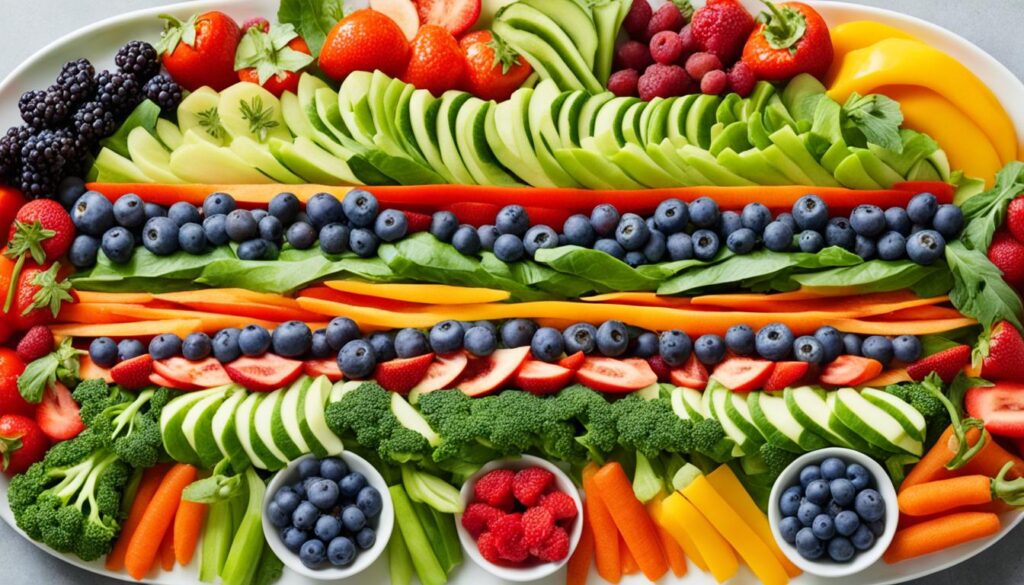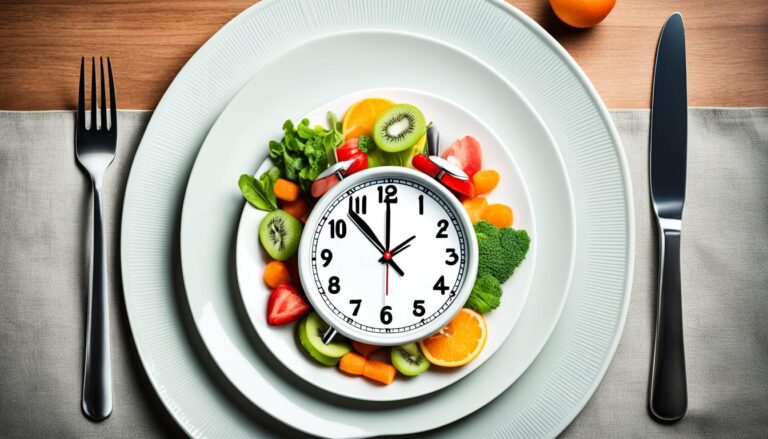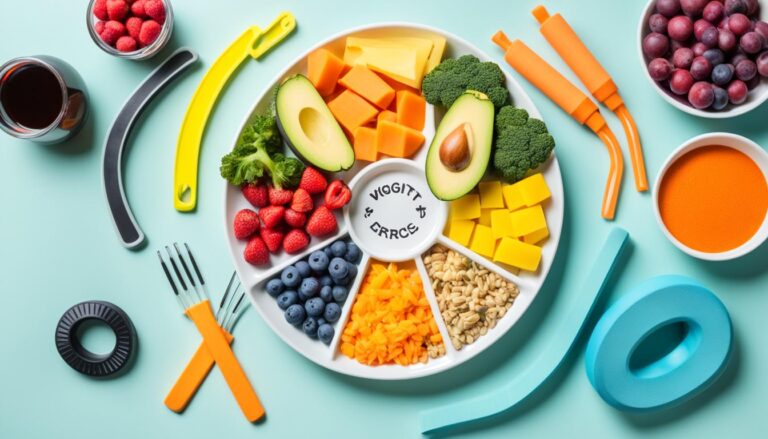Are you tired of trying countless diets that promise fast results but fail to deliver? Do you want to discover the secret to sustainable weight loss? Look no further! In this article, we will unravel the mystery behind finding your ideal weight loss diet.
Say goodbye to fad diets and embrace a plan that works best for you. Are you ready to embark on a journey towards a healthier, happier you?
Key Takeaways:
- Understand the caloric deficit to achieve weight loss.
- Consider food quality and meal frequency in your diet plan.
- Overcome weight loss plateaus with effective strategies.
- Assess your specific needs and preferences to find the best diet.
- Incorporate balanced macronutrients for sustained energy.
Understanding the Caloric Deficit for Weight Loss
To achieve weight loss, creating a caloric deficit is crucial. A caloric deficit occurs when you consume fewer calories than your body needs for daily activities and maintenance. This prompts your body to use stored fat as an energy source, leading to weight loss.
Let’s explore why a calorie deficit is key to losing weight, the role of food quality and meal frequency, and how to overcome weight loss plateaus.
Why a Calorie Deficit Is Key to Losing Weight
A caloric deficit is essential for weight loss because it forces your body to tap into its fat stores for energy. When you consistently consume fewer calories than your body requires, it will start breaking down fat to make up for the energy shortfall. This gradual fat loss results in sustainable and long-term weight loss.
However, it’s important to create a moderate caloric deficit that doesn’t exceed 500-1000 calories per day to avoid negative effects on your metabolism and overall well-being.
The Role of Food Quality and Meal Frequency
While a caloric deficit is important, it’s equally crucial to focus on the quality of the food you consume. Opting for nutrient-dense, whole foods ensures that you’re providing your body with essential vitamins, minerals, and macronutrients while maintaining a calorie deficit.
Prioritize lean protein sources, complex carbohydrates, and healthy fats to support muscle growth, optimize energy levels, and enhance satiety.
Additionally, paying attention to meal frequency can impact weight loss. While there is no one-size-fits-all approach, spreading your meals throughout the day and incorporating regular snacks can help control hunger and prevent overeating.
Some individuals find success with intermittent fasting, which involves limiting your eating window to specific hours of the day. Experimentation and listening to your body’s signals are key to finding the meal frequency that works best for you.
Overcoming the Plateau: Why Weight Loss Slows Down
Weight loss plateaus can be frustrating, but they are a common occurrence in any journey towards a healthier weight. When you consistently follow a caloric deficit, your body may adapt by reducing its metabolic rate, making it more challenging to lose weight. Additionally, as you lose weight, your body requires fewer calories to function.
To overcome plateaus, consider incorporating strategies like adjusting your caloric intake, increasing physical activity, and reassessing your food choices to break through the plateau and continue making progress towards your weight loss goals.

| Caloric Deficit Tips | Food Quality and Meal Frequency | Overcoming Plateaus |
|---|---|---|
| – Calculate your daily caloric needs | – Focus on nutrient-dense foods | – Adjust your caloric intake |
| – Track your food intake | – Spread meals throughout the day | – Increase physical activity |
| – Aim for a modest caloric deficit | – Incorporate regular snacks | – Reassess your food choices |
| – Listen to your body’s hunger cues | – Consider intermittent fasting |
Five Tips for Finding the Best Weight Loss Diet for You
Choosing the best weight loss diet for yourself can be challenging, but don’t fret! We have compiled five helpful tips to assist you in making an informed decision that suits your needs and goals.
- Assess your specific needs and goals: Each person has unique dietary requirements and weight loss objectives. Consider factors such as your current weight, health conditions, and lifestyle when choosing a personalized weight loss diet. Consulting with a healthcare professional or registered dietitian can provide valuable insights tailored to your situation.
- Consider your preferences and lifestyle: A successful weight loss diet shouldn’t feel like a chore. Take into account your food preferences and daily routine when selecting a plan. For instance, if you enjoy a variety of foods, a flexible diet that allows for customization might be your best bet. On the other hand, if convenience is key, a meal delivery service or a structured program could be more suitable.
- Research and gather information: Knowledge is power when it comes to finding the best weight loss diet. Take the time to explore different diet plans, whether it’s the Mediterranean diet, the Paleo diet, or something else entirely. Look for reliable sources of information, such as reputable websites, books, and scientific studies, to gain a comprehensive understanding of each diet’s principles, advantages, and potential drawbacks.
- Set realistic expectations: Be wary of weight loss diets that promise quick and drastic results. Sustainable weight loss is a gradual process that requires patience and consistency. Look for a diet plan that emphasizes healthy, long-term habits rather than temporary fixes. Remember, slow and steady wins the race!
- Seek support and accountability: Embarking on a weight loss journey can be challenging, but having support along the way can make a world of difference. Consider joining a weight loss group, seeking guidance from a dietitian, or involving a buddy who shares similar goals. The power of accountability and encouragement can help keep you on track and motivated.

Take these tips to heart and find the best weight loss diet for you. Remember, there is no one-size-fits-all approach when it comes to weight loss. By assessing your needs, considering your preferences, and gathering information, you can discover a personalized diet plan that aligns with your goals and promotes a healthy lifestyle.
Balancing Macronutrients for Sustained Energy
Achieving sustained energy and promoting weight loss requires a balanced intake of macronutrients. By understanding how to optimize your macronutrient intake, you can fuel your body effectively and support your weight loss goals.
Choosing High-Quality Carbs and Reducing Sugars
When it comes to weight loss, not all carbs are created equal.High-quality carbs provide essential nutrients and fiber while keeping you satiated.
Opt for whole grains such as quinoa, brown rice, and whole wheat bread instead of refined grains like white rice and white bread. These high-quality carbs digest more slowly and help stabilize blood sugar levels, keeping cravings at bay.
Reducing your intake of added sugars is another crucial aspect of a balanced diet for weight loss.Reducing sugar intake helps regulate insulin levels and prevents unnecessary calories from accumulating in your body. Choose fresh fruits as a natural source of sweetness and limit your intake of sugary beverages and processed snacks.
Incorporating Fiber and Unsaturated Fats Into Your Diet
Fiber is an unsung hero in weight loss. It promotes satiety, regulates digestion, and helps control blood sugar levels. Include fiber-rich foods such as fruits, vegetables, legumes, and whole grains in your meals to support weight loss and overall health.
Although fats often get a bad rap, unsaturated fats are beneficial for weight loss and heart health. Incorporate sources of healthy fats, such as avocados, nuts, seeds, and olive oil, into your diet. These fats help you feel satisfied after meals, enhance nutrient absorption, and support brain function.
By balancing your macronutrients and making smart choices about carbs, sugars, fiber, and fats, you can optimize your diet for weight loss and sustained energy.

| Macronutrient | Role | Food Sources |
|---|---|---|
| Carbohydrates | Provide energy for the body | Whole grains, fruits, vegetables |
| Protein | Build and repair tissues | Lean meats, fish, tofu, beans |
| Fats | Aid in nutrient absorption and hormone production | Avocado, nuts, olive oil |
Mindful Eating: Listening to Your Body’s Signals
Mindful eating is a powerful tool for weight loss and overall well-being. By practicing mindful eating, you can develop a deeper connection with your body’s signals and make conscious decisions about what and how much you eat.
Instead of relying on external rules and restrictions, mindful eating encourages you to tune in to your body’s natural cues and respond to them appropriately.
“The connection between the mind and body is undeniable. When we listen to our body’s signals and respond with kindness and awareness, we foster a healthier relationship with food and ourselves.” – Dr. Jennifer Thompson, Nutrition Specialist
So, how can you start incorporating mindful eating into your weight loss journey? Here are some actionable tips:
- Slow down: Take your time while eating and savor each bite. This allows you to fully experience the flavors and textures of your food and helps prevent overeating.
- Pay attention to hunger and fullness cues: Before eating, check in with yourself and assess your hunger level. During the meal, take breaks to evaluate your body’s signals of fullness. Stop eating when you feel comfortably satisfied.
- Eat without distractions: Minimize distractions such as television, phones, or work while eating. Instead, focus on the sensory experience of your meal, including the aroma, taste, and texture of the food.
- Listen to your body’s cravings: Honor your cravings without judgment. If you’re craving a certain food, allow yourself to enjoy it in moderation. This can help prevent feelings of deprivation and promote a balanced approach to eating.
- Practice gratitude: Cultivate a sense of gratitude for the nourishment your food provides. Reflect on the effort that went into producing the food and the positive impact it has on your well-being.
By incorporating these mindful eating tips into your daily life, you can develop a healthier relationship with food, enhance your weight loss efforts, and promote overall well-being.

Conclusion
In conclusion, the journey to finding your ideal weight loss diet is not a one-size-fits-all approach. It requires careful consideration and personalization, taking into account factors such as your caloric deficit, food choices, and mindful eating habits. By understanding these key elements and implementing them into your daily routine, you can embark on a successful weight loss journey.
Remember, patience is a virtue when it comes to achieving your goals. Weight loss is a gradual process, and it’s important to be kind to yourself along the way. Find joy in the small victories and celebrate your progress, no matter how small it may seem.
So, take the time to assess your needs, make informed decisions, and be flexible in exploring different approaches. Embrace the power of personalization in your weight loss journey, and you’ll be one step closer to achieving the healthier, happier you that you desire.





